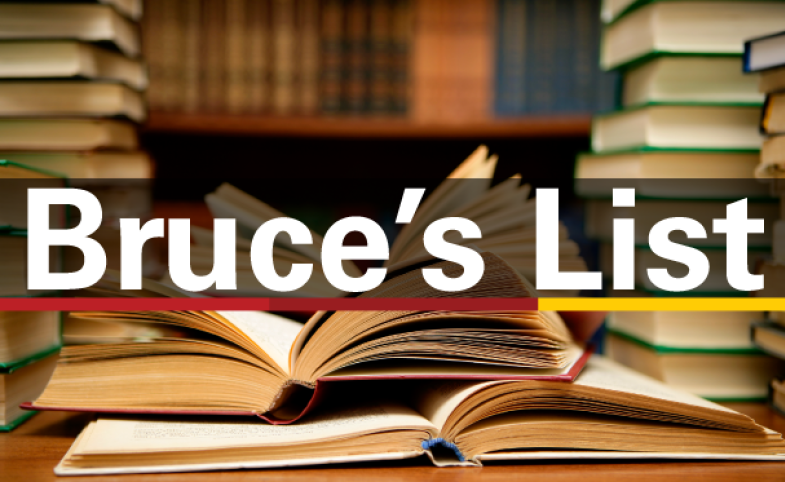The March 2015 edition of Bruce Gregory's public diplomacy reading list is now available. Known affectionately at CPD as "Bruce's List," this list is a compilation of books, journal articles, papers and blogs on a wide...
KEEP READING
Latest Reads in Public Diplomacy
The June edition of Bruce Gregory's public diplomacy reading list is now available. Known affectionately at CPD as "Bruce's List," this list is a compilation of books, journal articles, papers and blogs on a wide variety of PD topics, and features a number of CPD scholars. Highlights from this list include:
American Diplomacy at Risk, Report of the American Academy of Diplomacy, April 2015. This report, issued by a group of retired State Department career diplomats co-chaired by Ambassadors Marc Grossman and Thomas Pickering, makes five central claims: (1) American diplomacy (viewed primarily as the work of a “strong State Department” complemented by USAID) is being undermined by politicization of policies and appointments and State management’s efforts to “nullify” the Foreign Service Act of 1980; (2) the State Department is seeking to “break down all institutional, cultural and legal barriers between the Foreign Service and Civil Service;” (3) the Foreign Service lacks sufficient professional education and training; (4) the Civil Service is “mired in an outdated system;” and (5) substantial changes in policy and practice are needed to restore “American diplomacy” to its critical role in national security. The report reflects legacy views of Foreign Service Officers seeking to preserve and strengthen traditional roles.
Greg Barnhisel, Cold War Modernists: Art, Literature, and American Cultural Diplomacy, (Columbia University Press, 2015). Barnhisel (Duquesne University) contributes to the historical literature on U.S. cultural diplomacy with this inquiry into the way diplomats, the CIA, artists, and writers during the 1950s “offered American modernism in painting, literature, architecture, and music as evidence of the high cultural achievement of the United States.”
Mark Lagon and Sarah Grebowski, “Power to the People: Taking Diplomacy to the Streets,” The National Interest, February 26, 2015. Lagon (Freedom House) and Grebowski (Georgetown University) adopt the phrase “societal diplomacy” to frame the idea that the U.S. government must “carve out space for civil society worldwide,” especially in countries with illiberal governments, and further U.S. interests and legitimacy as a global leader by betting on relationships with democratic activists and community leaders who are likely to win power. As examples they discuss China and Saudi Arabia.
Jessica Stern and J. M. Berger, ISIS: The State of Terror, (William Collins, 2015). Stern (Harvard University) and Berger (Brookings Institution) stand out in the emerging literature on the Islamic State for their expertise on its origins and evolution, and their emphasis on its innovative uses of social media. The authors provide a timeline, a glossary of terms, and an appendix that explores the early history and core components of Islam and the development of jihadi Salafism in the 20th century.
Vivian Walker, Benghazi: Managing the Message, CPD Perspectives, USC Center on Public Diplomacy, April 2015. In this excellent case study, written especially for students at military and civilian universities, Walker (National Defense University and a retired U.S. Foreign Service Officer) focuses on two broad issues: (1) the U.S. government’s public responses to “Innocence of Muslims,” the anti-Islam video that led to widespread anti-American protests, and attacks on U.S. installations in Benghazi, Libya in 2012; and (2) challenges to the effective practice of public diplomacy due to globalization and rapid innovations in information technologies. An appendix containing a checklist on “managing short-term advocacy outreach efforts” and extensive endnotes add to the value of this teachable case.
S. Enders Wimbush and Eizabeth M. Portale, Reassessing U.S. International Broadcasting, March 2015. Wimbush (former director of Radio Liberty) and Portale (former vice president of RFE/RL), call for comprehensive changes in U.S. broadcasting that strengthen its capacity to tell “America’s story” in “a war of ideas” and its relocation in structures closely linked to U.S. foreign policy objectives and planning processes. Responding to the report in a Voice of America interview, the Broadcasting Board of Governor’s Interim CEO Andre Mendes said “we see a disconnect between the external perceptions of the BBG and the actual measures and demonstrable impact of our networks.”
The complete list is available here.
Visit CPD's Online Library
Explore CPD's vast online database featuring the latest books, articles, speeches and information on international organizations dedicated to public diplomacy.
Popular Blogs
-
January 29
-
January 20
-
January 28
-
January 2
-
January 8










